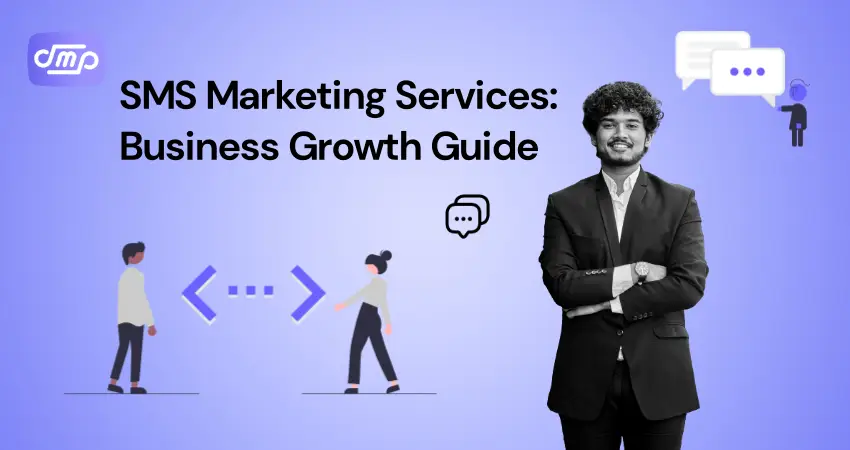
- August 23, 2023
- Digital Marketing
What are SMS marketing services?
Sending promotional or educational messages to a group of people via SMS (Short Messaging Service), also known as text messaging, is known as SMS marketing.
SMS marketing messages can include a range of information, such as product releases, event invitations, promotional offers, and more. Businesses and organizations often use SMS marketing services to advertise their goods and services, raise brand awareness, and interact with customers.
Because text messages have a high open rate and are often read right away, SMS marketing services can be a successful marketing tactic. Furthermore, SMS messages may be tailored and sent to particular client groups, making them an effective tool for fostering customer relationships and boosting sales. Before sending SMS messages, it is crucial to gain clients’ explicit authorization and make sure the messages are compliant with all applicable laws and regulations.
Types of SMS marketing services

Businesses can engage with their customers via a variety of SMS marketing initiatives. These are a few typical SMS marketing formats:
Promotional campaigns
These efforts aim to inform consumers about a certain good, service, or deal. Discounts, one-time bargains, and other special offers are sometimes included in promotional SMS messages. In SMS marketing, promotional marketing is the practice of reaching out to potential customers by text messages to advertise a service, good, or event. This kind of marketing is a direct method of communication that enables companies to quickly and efficiently reach customers.
- A call-to-action, such as a coupon code, a link to a landing page, or an event invitation, is frequently included in promotional SMS messages. The intention is to persuade the audience to engage in a certain business-friendly action, like making a purchase or going to an event.
- Because it enables firms to tailor their advertising to particular customer groups based on characteristics like location, interests, or past purchase behaviour, promotional marketing in SMS marketing can be quite successful. In comparison to other types of advertising, like print or TV ads, it is also more affordable.
- But, it’s crucial to make sure that marketing materials have a clear opt-out option and are only delivered to recipients who have agreed to receive them. Fines and harm to a brand’s reputation can occur from failing to follow legal standards and best practices for SMS marketing.
Reminder campaigns
Reminder campaigns for SMS marketing are automated texts that are delivered to clients or prospects to remind them of an impending event, a deadline, or a task they need to complete. These reminders can be programmed to be sent out at particular intervals or on particular dates, and they can also contain tailored information to make the message more pertinent to the recipient.
Reminder campaigns for SMS marketing can help companies increase revenue, eliminate missed opportunities, and improve customer engagement. Businesses can save time and money while sending clients timely and pertinent information by automating the reminder process. Some of the examples for remainder campaigns include:
- Reminders for appointments: A day or two before the client’s scheduled appointment, healthcare professionals, dentists, hairdressers, and other service-based businesses can send automatic SMS reminders to their clients. By doing this, you can lessen the possibility of no-shows and make sure everything goes properly in the company.
- Payment reminders: Companies that provide subscription-based services or who have customers on payment plans can send SMS notifications to remind customers of upcoming or past-due payments. This can enhance cash flow and lessen the possibility of missing payments.
- Reminders about events: Companies can SMS customers a reminder about future events, such as product launches or specials. These reminders may contain information on the occasion and any applicable promotions, which may boost participation and involvement.
- Reminders for abandoned carts: Online retailers can send SMS notifications to customers who added products to their carts but abandoned them before checking out. The reminder might offer a discount as an inducement for the customer to finish the transaction and incorporate a link to their shopping cart.
Informational materials
The provision of instructional content that customers can access and learn from, such as infographics, videos, or blog articles.SMS marketing education campaigns are SMS marketing tactics that aim to send educational resources and information to clients or prospects via text message.
- These initiatives can aid companies in increasing audience awareness, establishing thought leadership, and giving valuable information to their audience.
- The secret to a fruitful education campaign via SMS marketing is to offer them worthwhile and pertinent content.
- These initiatives can aid in establishing a brand as an authority in its field and cultivating consumer trust. To prevent coming off as spammy or obtrusive, it’s crucial to balance commercial advertising with informative messaging.
- Moreover, SMS marketing education efforts should always adhere to the law and industry standards for SMS marketing, including getting the recipient’s agreement to receive messages and offering obvious means to unsubscribe.
- These efforts aim to inform consumers about a good or service. Instructional SMS messages might contain hints, how-to manuals, or other useful data.
- Regardless of the SMS marketing strategy a company chooses, it’s critical to make sure that messages are timely, relevant, and valuable to customers.
Examples of SMS marketing education programmes include:
- How-to Guides: Companies can send SMS messages with tutorials and how-to guides on subjects connected to their goods and services. A technology company might give instructions on how to utilise its products, or a fashion retailer might send advice on how to dress certain clothing.
- Expert Insights: Companies can send SMS messages that include observations from subject-matter experts. Messages from financial advisors on subjects like investing or retirement planning, for instance, could be sent by a financial services company.
- Industry News: Companies can send SMS messages including the most recent information and trends related to their sector. For instance, a marketing firm might give updates on the most recent digital marketing strategies, or a healthcare practitioner might send updates on novel medications or other advances in medicine.
- Training and Development: Companies can send SMS messages that link their consumers or staff to training and development resources. An example would be a software business sending emails containing tutorials or training videos on how to utilize their software.
Benefits of SMS marketing services

Businesses can gain from SMS marketing services in several ways, including:
- High open rates: According to some surveys, up to 98% of text messages are read right away. SMS communications have a high open rate. Because of this, SMS marketing is a successful method for ensuring that customers see messages.
- Instantaneous communication: Because SMS messages are instantaneously delivered, they are a wonderful way to share time-sensitive information, such as alerts, reminders, or promotions.
- Cost-effective: SMS marketing services have the potential to be a cheap method of contacting clients. SMS messages often don’t have any design or manufacturing expenditures, unlike other kinds of advertising.
- Tailored messages: SMS marketing services enable companies to send tailored messages to particular customer groups based on variables like demographics, location, or other criteria.
- A greater degree of engagement: SMS messages, which are frequently read and promptly reacted to, can offer a higher level of engagement than other kinds of marketing. Better customer connections can be achieved by using SMS marketing to send customers individualized messages that are pertinent to their needs and preferences.
- Opt-in nature: As customers must voluntarily choose to receive SMS messages, they are frequently more receptive to them.
Steps involved in creating SMS marketing
The general steps in developing an SMS marketing campaign are as follows:
- Set campaign objectives: Decide what your SMS marketing campaign should accomplish. Do you want to boost sales, raise brand recognition, or cultivate a devoted following of clients? Your planning will be guided by your campaign objectives.
- Create a list of SMS subscribers: Before sending consumers SMS messages, you must get their express permission. To get phone numbers, think about using opt-in forms on your website, social media, or in-store. Many SMS marketing solutions are available that can assist you in managing your subscriber list, creating and sending messages, and tracking the success of your campaigns.
- As you write your SMS messages: Create compelling, clear, and concise SMS messages. A call-to-action (CTA) that urges customers to take action, such as making a purchase or visiting your website, should be included.
- Personalise your message: Utilize consumer information to personalise your messaging by mentioning the customer by name or mentioning previous transactions.
- Perform A/B testing: Before sending your messages to your whole subscriber list, test them out on a small sample of your target audience to make sure they are successful. A/B testing can help you compare various messages and improve your strategy.
- Track and evaluate the effects of your campaign: Track the outcomes of your campaigns, including open rates, click-through rates, and conversions, using your SMS marketing platform. Use this information to better subsequent campaigns by honing your strategy.
Always make sure that your SMS marketing efforts abide by all applicable laws and rules, including gaining customers’ express consent and including opt-out instructions in your messages.
Email marketing vs SMS marketing

Both SMS and email marketing are widely used digital marketing platforms, however, there are some significant differences between them.
- Reach: Due to the fact that more individuals have email addresses than phone numbers, email marketing often has a wider reach than SMS marketing. Yet, because SMS marketing enables more tailored messages, it may be more successful in targeting a particular group.
- Open Rates: As text messages are frequently read shortly after being received, SMS marketing normally has greater open rates than email marketing. Emails, however, can be easily missed or put in spam bins.
- Content: Email marketing enables more comprehensive and in-depth material, including lengthier written copy and graphics. Contrarily, SMS marketing necessitates shorter, more succinct messaging due to character restrictions.
- Frequency: SMS marketing efforts often have a lower frequency due to the risk of annoying or spamming clients. As long as they offer value and don’t come across as spam, email marketing campaigns can be sent out more frequently.
- Cost: Because text messages are often more expensive to transmit than emails, SMS marketing sometimes can be more expensive than email marketing.
- Opt-in Requirements: Unlike email marketing, which may just require an opt-out option, SMS marketing frequently requires explicit opt-in agreements from customers. This increases the compliance of SMS marketing but may also make it more challenging to grow a subscriber base.
In conclusion, SMS marketing delivers higher open rates and more focused messages, whereas email marketing is typically more affordable and flexible in terms of frequency and content. In the end, a business’s specific goals, target audience, and messaging strategy will determine which of the two channels to use.
SMS marketing best practices
Businesses can establish SMS marketing campaigns that engage customers, produce results, and foster trust and loyalty by adhering to these best practices.The following are some SMS marketing best practices:
- Before sending any marketing messages to customers, obtain their clear, opt-in consent. This entails giving them specific details about the communications they will receive and how frequently they will be sent.
- Ensure that each message offers the receiver something of value. This might be a marketing offer, special material, or useful information.
- Make sure your message is brief, clear, and understandable.
- Utilize client information, such as their name or previous purchase history, to customise communications.
- When the customer is likely to be available or during business hours, send messages at the proper time.
- Ensure that each communication contains a clearly stated call to action, such as a link to a website or a coupon code.
- Don’t bombard clients with too many messages or they might unsubscribe. Take into account their preferences and modify communications frequency as necessary.
- Make it simple for clients to opt-out if they so choose by including an opt-out option in each message.
- To find out what is effective and what needs to be improved, continuously test and gauge your SMS marketing efforts.
- Be sure that the laws are followed by your SMS marketing initiatives.
How does sms marketing work for a business?
SMS marketing benefits a company by allowing them to text clients and potential customers straight from their mobile phones. It’s a permission-based marketing channel that enables companies to notify users of updates, notifications, and promotional messages.
Here is how SMS marketing for a business normally operates:
- Create a subscriber list: Companies can create a subscriber list by encouraging customers to sign up for their SMS service via numerous platforms, like their website, social media, or in-store promotions. By texting a keyword to a predetermined phone number, customers can opt-in. List segmentation enables you to customize your messaging for various client demographics. You may, for instance, segment based on interests, region, or previous purchasing history.
- Plan Your Campaign: While planning your campaign, consider the message kind, frequency, and timing that you want to use. After you have a strategy in place, write your message and send it to your subscribers. Ensure that your message is valuable, tailored, and has a clear call to action.
- Monitor and improve: Track data like open rates, click-through rates, and conversions to gauge the success of your SMS marketing campaign. Use this information to gradually improve your messaging approach.
Because SMS marketing has high open rates and offers an immediate and direct method of contacting clients, it can be effective for businesses. It can be a useful avenue for advertising goods and services, increasing sales, and cultivating client loyalty. To prevent overwhelming clients or breaking the law, it’s crucial to adhere to established practices, secure customer consent, and be cautious of frequency.
How do you set up SMS marketing messages?
There are a few crucial stages to setting up SMS marketing messages:
- Get Consent: Prior to sending any marketing messages, confirm that the receiver has given you express consent to send them SMS messages.
- Choose an SMS marketing platform: There are a number of SMS marketing platforms on the market that offer tools to assist with creating, planning, and tracking your SMS campaigns.
- Establish your marketing objectives: Set your target market and the message you want to get over to them. Keep your message short and straightforward.
- Create a message: Make sure your message has a compelling call to action that inspires readers to take the intended action. Use clear, simple language.
- Customize your communications: Customization can assist raise conversion and engagement rates. To make the experience more individualised, use the recipient’s name or other pertinent information.
- Plan and send out your campaign: Consider your audience’s time zone and daily schedule when you decide when to send out your communications. Your SMS marketing platform can be used to plan and send messages.
- Use the analytics tool: Utilize the analytics tools provided by your SMS marketing platform to track the effectiveness of your campaign, including open rates, click-through rates, and conversions. Use this information to better subsequent campaigns and your messaging.
- Follow the rules: Do not forget to abide by all applicable laws, such as the Telephone Consumer Protection Act (TCPA), and offer recipients a simple means to stop receiving such messages.
Pairing SMS marketing with email marketing?
Combining SMS and email marketing can be a powerful strategy for reaching your audience and boosting engagement. The following methods will assist you in combining SMS and email marketing:
- Split your audience into various segments according to their preferences, actions, and interests. Your messaging will be more tailored and your campaigns will be more focused as a result.
- Use identical wording and branding throughout both your SMS and email marketing communications to ensure consistency. This aids in giving your audience a consistent brand experience.
- Ensure your SMS and email marketing initiatives are in compliance with all applicable laws and rules, including the TCPA and the CAN-SPAM Act.
- Arrange your SMS and email advertisements to complement one another by coordinating your timing. For instance, you can use SMS to provide time-sensitive information, like event reminders or flash specials, and email to communicate more in-depth information or offers that are available for a longer period of time.
- Make use of both platforms to give your audience access to exclusive content or deals. For instance, you can send a discount code or an invitation to a special event by SMS, while sending a longer-term offer or more thorough information via email.
- You can develop a more thorough marketing plan that uses a variety of channels to reach your target and conveys a consistent brand message by combining SMS and email marketing.
Conclusion
In general, SMS marketing services can assist companies in becoming thought leaders in their field, establishing trust with their audience, and giving value to their clients or prospects. Businesses may communicate with their audience more personally and interactively by sending instructional content via text messaging, enhancing the overall customer experience. SMS marketing services have the potential to be a potent tool for businesses to interact with customers, increase brand recognition, and boost sales. Verify that your SMS marketing initiatives follow best practices and legal requirements, especially those related to data protection.












